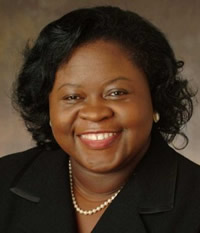
|
Commemorating National Black HIV/AIDS Awareness Day
February 7, 2013 | By Hazel D. Dean
 Today is the 13 th annual observance of National Black HIV/AIDS Awareness Day. Today is the 13 th annual observance of National Black HIV/AIDS Awareness Day.
In Black America, HIV continues to be a crisis. African Americans account for half of the 1 million plus Americans living
with HIV, nearly half of all new HIV infections in the U.S. each year, and half of all those who die from AIDS annually. If we are
to end this epidemic, we have to address the spread of HIV in Black America, and each of us can play a role. Each of us has
the power to make a difference - everyone and every action counts.
We do have some promising news. Recently CDC reported data showing that new HIV infections among black
women are declining for the first time in over a decade. Good news, yet black women continue
to be far more affected than other women - making up more than 60% of all cases among women and 13 percent of all US infections.
Young black men - particularly our gay and bisexual youth - are, by far, the hardest hit, with continuing diagnoses of new
infection occurring more often in this group than any other in this country.
But we can continue to reduce these numbers in black women and begin to do so for black men. We know that HIV is
preventable. There are things we can all do, starting today, to protect ourselves and our partners.
- Educate your friends, neighbors, communities about HIV.
- Get tested. It is the first step. We know that African Americans are more likely to get tested for HIV than others, yet two in five still have never been tested.
- If infected with HIV, get connected with a health care provider. Early treatment with HIV medicines can lower the level of virus in the body, help people with HIV live longer, healthier lives, and lower the chance of passing HIV to sexual partner(s). If you do not have a provider or cannot afford HIV medicines, you may qualify for Ryan White services, which are for people with HIV/AIDS who need care but can't afford it. Find a Ryan White HIV/AIDS Program provider near you at Find HIV/AIDS Medical Care . Type in your address and click 'Search.'
These are clear steps: educate yourself, get tested, and get treated if needed. But there are underlying issues that
fuel HIV in black communities that are both social and environmental:
- Access to health care : We know that if you don't have the means to see a doctor, you may not get an HIV test or treatment until it's too late. In 2011, nearly 20 percent of African Americans were without health insurance.
- Economic barriers : Research shows us that those who can't afford the basics in life may end up in circumstances that increase their HIV risk. Today, nearly 28 percent of African Americans live in poverty.
- Incarceration : Incarceration can lead to simultaneous relationships that, in turn, can help spread HIV.
- Sexual transmitted diseases : STDs increase the risk for contracting HIV.
- Stigma and homophobia : Prevalent in all communities, these continue to prevent too many African Americans from seeking treatment, testing and support.
We have a personal responsibility to protect our own health, but we also have a broader responsibility to contribute
to the health of our community. Talk openly about HIV. Speak to your children, your peers, your partners about HIV. Use Twitter,
Facebook and other social media platforms to lend your voice to the conversation and speak out against stigma and homophobia.
We can all create safe spaces in our homes, schools and places of worship to talk openly and honestly about HIV.
Today, we have more tools than ever to win the fight against HIV -- but for these to make a difference, we must
commit to use them. National Black HIV/AIDS Awareness Day is an opportunity for each of us to do just that. Together we can increase HIV prevention activities, promote HIV testing, and assist those with HIV to get connected to effective HIV medical care that reduces morbidity, mortality, and HIV transmission. Let's take the time and give the energy needed to achieve an AIDS free generation.
A note from AIDS.gov: To find HIV testing and other services, please use the HIV Testing Sites & Care Services Locator .
###
Sources:
[1] Diagnoses of HIV Infection and AIDS in the United States and Dependent Areas, 2010 .
[2] Vital signs: HIV testing and diagnosis among adults - United States, 2001-2009. MMWR 2010;59(47):1550-55.
[3] Summary Health Statistics for the U.S. Population: National Health Interview Survey, 2011, Appendix III, table XVI [PDF - 1 MB]
[4] People in Poverty by Selected Characteristics: 2010 and 2011 [PDF - 69k]
Source: http://www.nih.gov/news/health/feb2013/nichd-08.htm
Contact:
Robert Bock
301-496-5133
For more HIV and AIDS News visit...
Positively Positive - Living with HIV/AIDS:
HIV/AIDS News |